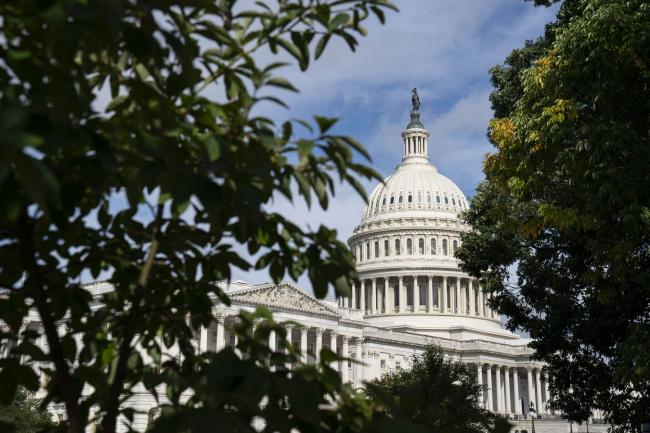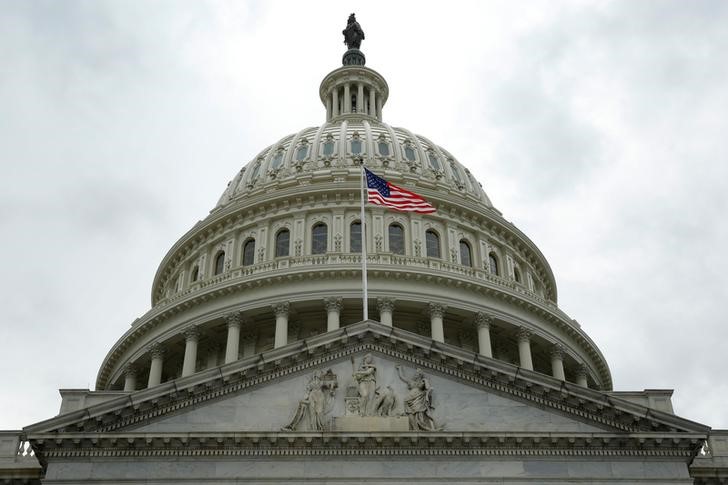(Bloomberg) -- The risk of a brief U.S. government shutdown over the weekend rose Wednesday with congressional Republicans and Democrats split over a short-term spending bill needed to keep agencies running and some GOP lawmakers threatening a holdup to protest vaccine mandates.
Majority Democrats are looking to extend current agency funding into January or later given the impasse with Senate Republicans on full-year fiscal 2022 spending bills. While party leaders expressed confidence that the differences would get resolved in time, they have yet to schedule any action on a stopgap bill.
Democrats said they have not gotten a proposal from Republicans on how long the stopgap should last and there are growing concerns that a faction of conservatives will attempt to trigger a shutdown to block funding for President Joe Biden’s initiative requiring large private employers to either mandate vaccinations against Covid-19 or provide weekly testing.
“We need to point out where the logjam is and right now the logjam is in the U.S. Senate,” Representative Richard Neal, a Massachusetts Democrat, said. He called any attempt to defund the government over vaccine mandates is “nonsensical.”
“I can’t imagine we would walk back the safety precautions,” he said.
House Appropriations Chair Rosa DeLauro said she is working to resolve the impasse through bipartisan talks and expressed hope it would get done.
“Negotiations are underway. There is no interest in shutting the government down. We are not shutting the government down,” he said. She acknowledged that time is running short, however.
“Nobody knows that better than I do,” DeLauro said.
Senate Roadblock
Meeting the end-of-week deadline will require cooperation from all Senate Republicans. Although there is likely enough support from GOP senators to pass a stopgap, any one senator can demand extra procedural steps in the Senate that can drag on for nearly a week.
That could come from an effort by a group of GOP senators to link support for the stopgap measure to halting funding for the Biden administration’s workplace rule on vaccinations and testing.
Kansas Senator Roger Marshall led a Nov. 3 letter signed by 10 other Senate Republicans pledging to oppose all efforts to implement the vaccine mandate, including by objecting to government funding bills. Marshall’s office pointed to that release when asked Wednesday about whether the senator would hold up the funding bill.
Senate Republican leader Mitch McConnell told reporters Tuesday that he was confident a break in government funding could be avoided.
“We won’t shut down,” McConnell said.
Senate Majority Leader Chuck Schumer said he and McConnell were “having good conversations” about the stopgap but warned that the group of conservatives may hold things up.
“I hope that a small group of Republicans don’t choose obstruction and try to shut down the government,” Schumer said. “It’s always easy to say you want to shut down the government over something I care about, this one cares about, that one. If everyone did that we’d have chaos. We need to come together and keep the government open.”
Unity Test
Some House Republicans, led by the Freedom Caucus, also support the effort to shut down the government to prevent enforcement of the federal vaccine or test requirement for private employers. The group argues the policy infringes on individual liberties.
“We therefore write to request that you use all procedural tools at your disposal to deny timely passage of the CR unless it prohibits funding – in all respects – for the vaccine mandates and enforcement thereof,” the Freedom Caucus wrote to McConnell on Wednesday.
For some House conservatives, it’s a test to see if the conference can unite in opposition to Biden.
“You’re not going to be able to stop them from doing everything,” Ohio Republican Representative Warren Davidson said. “They have the majority. But can you pick an issue and unite Republicans and make a difference, even from the minority?”
The Freedom Caucus group wouldn’t be able to delay action in the House and other Republicans aren’t inclined to oppose a stopgap funding measure.
“Probably because they think, somehow, creating chaos -- which they are masters of -- will hurt president Biden,” New York Representative Hakeem Jeffries, the House Democratic caucus chair, said. “It’s not going to work. We’re prepared to act.”
If the stopgap doesn’t turn out to have any objectionable policy provisions, Representative Mark Amodei, a Nevada Republican who is a member of the Appropriations Committee, said the GOP conference should support it.
Previous shutdowns have proven unsuccessful, Amodei said.
“The threat of shutting down, in my experience, has never worked to get the side that shut it down what it wanted,” Amodei said. “We shut it down over health care for a long time and when we opened it up, nothing had changed.”
A new stopgap measure is necessary because Congress has failed to pass any of the 12 annual appropriations bills needed to fund ordinary government operations for the fiscal year that began Oct. 1. Democrats and Republicans have yet to begin serious talks to resolve their differences on the bills, with Republicans demanding Democrats reject an array of policy provisions such as government funding for abortions before talks on funding levels begin.
The stopgap measure puts agencies on autopilot, freezing in place program funding levels and forbidding new contracts, with few exceptions.
©2021 Bloomberg L.P.

